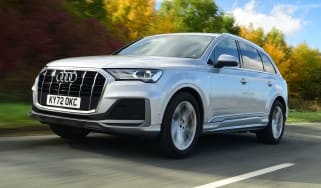New Audi Q7: release date, price and specs
New 2015 Audi Q7 will offer more passenger space for up to seven and the choice of diesel or hybrid engines
The new Audi Q7 – the Audi’s rival to the Range Rover – will be lighter, smaller and cheaper to run than ever before when it goes on sale next year.
The 2015 Audi Q7 will retain the ability to seat seven, and despite its more compact dimensions, Audi says there will be even more space inside.
There’s a new look for the big SUV, and the interior will bristle with the firm’s latest technology, including the superb hi-res screen that has replaced the speedometer in the recently-launched Audi TT coupe.
New Audi Q7 styling and design
The 2015 Audi Q7 will still be an imposing large SUV, but will be fractionally shorter and narrower than before, but will be the same height as before. Despite this, interior space has increased.
Audi says the exterior design is a nod to its iconic four-wheel drive sports cars, and points to the horizontal lines above the wheels as proof. There’s a more angular look than before, and the front end in particular bears more than a passing resemblance to the latest Audi TT.
The biggest change is under the skin, where Audi’s engineer have managed to reduce the car’s weight by up to 325kg - equivalent to a concert grand piano. To do this, Audi has used lightweight aluminium and has even managed to reduce the weight of the electrical system and the boot floor.
Despite the new Audi Q7 is said to have crash safety and occupant protection of the “highest level”.
New Audi Q7 interior
The new Q7 has been designed to be easier to operate, despite more technology on offer. Key to this is a reduction in the number of buttons on the dashboard. Functions can be controlled via Audi’s MMI control wheel and monitored through a large screen which remove the need for traditional analogue instrument dials.
The Audi Q7 will be quieter than ever before and passengers will enjoy more space. There will be more head, shoulder and knee room and the three rear seats can individually slide and recline.
Two more seats can be added at extra cost, turning the new Audi Q7 into a seven seater. Both of these seats are certified Group 3 child seats.
There will be more head and shoulder room than for the sixth and seventh occupants. When folded, the seat back integrate into the boot floor and can be raised and lowered electrically.
All seats passenger seats have ISOFIX mountings, meaning up to six child seats can be fitted.
With all seven seats in place, the new Audi Q7’s boot measures 295 litres, which grows to 890 and 2,075 with the third and second row seats folded. The boot floor is lower than before, making loading luggage easier, and an electrically operated bootlid is standard on all models. This can be opened or closed by waving a foot under the rear bumper when the car is fitted with Audi’s Advanced Key option.
New Audi Q7 price & release date
The new Audi Q7 will make its first public appearance at the Detroit motor show in January and will go on sale around the middle of the year. Prices are likely to increase slightly over the current model, which starts at £44,000.
New Audi Q7 engines and running costs
The Audi Q7 will launch with a single engine: a 3.0-litre TDI diesel developing 273bhp. That will enable the new Audi Q7 0-62mph time to be just 6.3 seconds with a 146mph top speed. Despite this, the Q7 will return 47.8mpg and emit 153g/km of CO2.
A second version of the 3.0-litre engine will join the range at a later date. This engine will develop 215bhp, and although no performance, MPG or CO2 figures have been released, it will set “new standards” for the large SUV market according to Audi.
Economy will be aided by a feature called predictive efficiency assistant, which uses data from the sat-nav and traffic sign recognition in conjunction with the car’s adaptive cruise control to tell the driver when to reduce speed efficiently. It also informs the engine and gearbox when best to coast and is claimed to reduce fuel consumption on some roads by up to 10%.
Next year, the range will be expanded with the introduction of the Audi Q7 e-tron. It will be the world’s first six-cylinder diesel engine to be available with four-wheel drive. It will be capable of driving up to 34.8 miles on a full electric charge, meaning to can return up to 166mpg with CO2 emissions of less than 50g/km.
With a total power output of 368bhp, it will be capable of covering 0-62mph in 6.0 seconds with a top speed of 139mph.
Audi claims the new Q7 will be more fun to drive than before, with four-wheel steering which increases agility at speed and reduces the car’s low-speed turning circle. Air suspension, which increases comfort or sportiness as required, will be an option.
New Audi Q7 specs
Although the new Audi Q7’s equipment and specifications will be announced closer to going on sale, certain standard equipment, such as leather seats, alloy wheels and a 12.3-inch sharp display are all given.
Two-zone climate control will be fitted as standard, but can be expanded to a four-zone system optionally. The Q7 will also be fitted with the latest generation of Audi’s MMI controller to operate features such as the audio, navigation and phone.
The system’s movement can be heard and felt, and includes a touchpad to ‘write’ characters or to perform functions such as zooming in or out using gestures. The system also includes ‘natural speech control’, which allows the driver to use natural language to control features, rather than having to learn a set of pre-defined terms.
Other features available as standard or optionally will include Bose or Bang & Olufsen audio systems, wifi-enabled tablets functioning as web-ready rear screens through the in-car wifi hotspot, automatic emergency braking and a range of electronic safety aids.
To read reviews of the current Audi line-up, head over to the Carbuyer Audi reviews page
Recommended
Most Popular

Polestar 3 review – upmarket and well-built SUV contender
Newsletter signup form
Tips & advice

Car dashboard warning lights: what does each symbol mean?

Electric car charging stations: public networks, charger types, apps and maps








